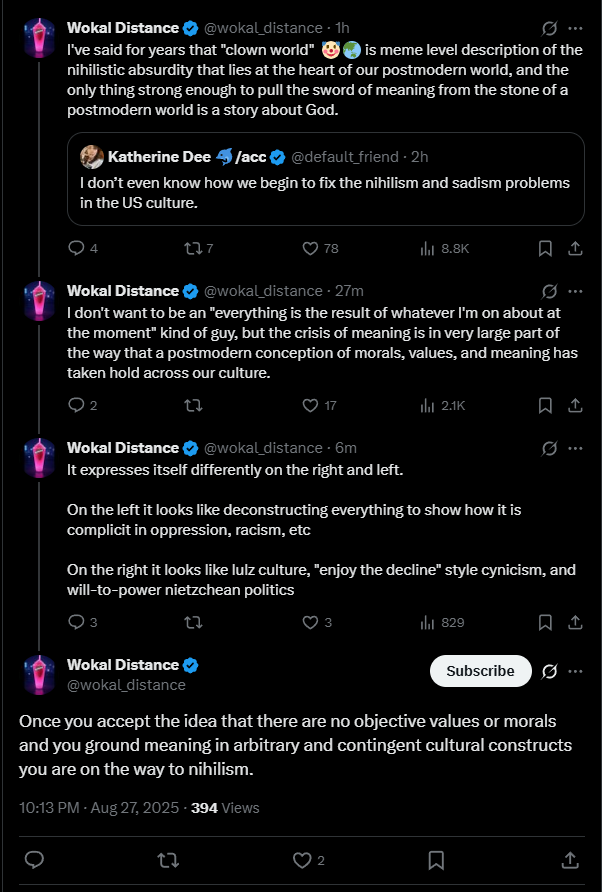Beyond Clown World
God, nihilism, and the conditional nature of values
Wokal Distance asserts that the meme “clown world” encapsulates the nihilistic absurdity of postmodern life, and further insists that only a story about God can redeem meaning. This is rhetorically effective but philosophically imprecise. It confuses the collapse of objective morality with the collapse of meaning itself, as though without divine authority, significance must necessarily vanish into absurdity. This is less an argument than a longing for metaphysical certainties that no longer persuade.
The Symptom: Nihilism on Left and Right
The cultural diagnosis is not entirely mistaken. Nihilism manifests differently across the political spectrum:
On the left, it takes the form of perpetual deconstruction: all values unmasked as complicity in oppression, racism, or power.
On the right, it appears as ironic detachment, “lulz” culture, and a shallow Nietzschean posture of will-to-power.
Both forms reflect a vacuum where older certainties once stood.
The Error: Equating Contingency with Collapse
The error lies in conflating the recognition of contingency with nihilism. To see that values are contingent upon culture and history is not to abolish them. It is to free them from the illusion of unconditionality. Wokal’s dichotomy—either God-given morality or clownish void—is too crude. The recognition of contingency does not obliterate meaning; it makes meaning more deliberate, more accountable, and more authentic.
Conditionalism: The Harder Truth
Conditionalism does not seek refuge in absolutes. It insists that all truths, values, and meanings are conditional upon background assumptions. This is not a counsel of despair but of responsibility:
Truths: If X, then Y.
Values: If we desire flourishing, then cooperation matters.
Meaning: If I care about this life, then these actions matter.
This framework does not erode meaning. It grounds it in human agency. We do not inherit significance; we must choose it, construct it, and defend it.
Phosphorism: Affirming Chosen Values
Wokal offers only two options: the void or divine command. There is a third: conscious affirmation. Phosphorism articulates this stance, affirming life, intelligence, complexity, and authenticity—not as eternal decrees but as deliberate commitments. These are values carried forward because they matter, not because they are metaphysically imposed.
Conclusion
The cultural condition often described as “clown world” is indeed real, and the memes resonate because they point to a genuine void. Yet the solution is not a retreat into discredited absolutes. It is to accept the conditional nature of meaning, and to bear the responsibility of consciously choosing our values. This is not nihilism. It is freedom, and it is the essence of agency.




It continues to puzzle me why many people believe that a god gives meaning to life or provides a source of values. "Because I say so" is not a sound support for either.